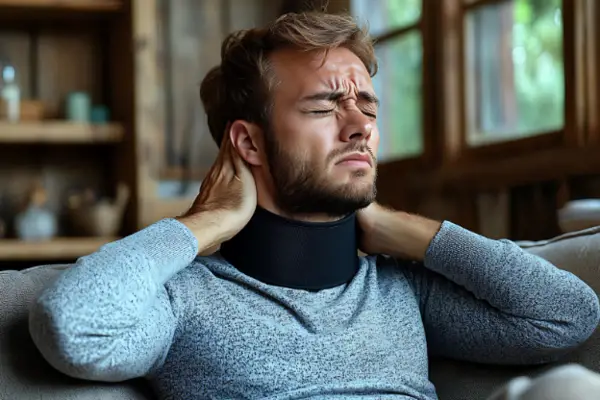
How To Treat Persistent Headaches After a Car Accident
Headaches after a car accident are a common yet often overlooked symptom that can indicate underlying injuries. Whether caused by whiplash injury, concussion headaches, or muscle tension, persistent pain should never be ignored, as it may signal brain injury or neck injury.
Post-traumatic headaches can develop hours or even days after a motor vehicle collision, making them one of the most frequent delayed injuries. Here are some of the best accident recovery solutions that can help you restore your quality of life.
1. Seek Immediate Medical Attention
If you experience persistent headaches after an auto accident, your first step should be to consult a neurologist or visit an auto injury clinic. A comprehensive evaluation—featuring neurological assessments along with imaging tests like CT scans or MRIs—can identify problems ranging from skull fractures and brain bleeds to misalignments in the cervical spine.
2. Understand the Type of Headache You're Experiencing
Headaches following a motor vehicle accident can vary widely. Common types include:
- Whiplash headache (from sudden cervical flexion)
- Post-concussion headache (due to brain trauma)
- Occipital neuralgia headache (caused by irritated cranial nerves)
- Cervicogenic headache (linked to spinal vertebrae misalignment)
- Cluster-like headaches (severe, recurring pain)
Proper headache classification ensures the right treatment plan, whether it involves physical therapy, medication management, or interventional medicine.
3. Document Injuries for Insurance and Legal Purposes
If your headaches started after a car crash, you could get reimbursed for your doctor bills and missed paychecks. Under No Fault insurance (or Personal Injury Protection), seeing a no fault doctor ensures your insurance claims are properly documented. In severe cases involving brain damage or spinal cord injury, consulting car accident lawyers in Boston can help secure fair compensation.
4. Follow a Comprehensive Treatment Plan
Depending on your diagnosis, treatment may include:
- Physical therapy to relieve muscle spasms and improve cervical spine mobility
- Chiropractic care or spinal manipulation for alignment issues
- Trigger point injections or Botox injections for chronic muscle contraction/spasm
- Pain management strategies for migraine headaches or cluster headaches
- Cognitive therapy is used if brain function tests reveal cognitive impairments
A multidisciplinary team ensures complete care, addressing both physical and neurological symptoms.
5. Prevent Future Complications
Ignoring persistent headaches can lead to worsening conditions, such as chronic post-traumatic headaches, Alzheimer's dementia (in rare cases of severe brain trauma), or normal-pressure hydrocephalus. Follow-up brain scans, blood tests, and regular check-ups with your neurologist can monitor recovery and prevent complications like intracranial pressure or cerebrovascular insults.
Why Some Headaches Worsen Over Time (Instead of Improving)
Persistent headaches after a car accident may worsen due to undiagnosed underlying issues, such as untreated muscle imbalances or nerve compression. A minor whiplash injury, for example, can lead to chronic muscle tension that progressively strains the cervical spine, intensifying pain. Additionally, inflammation from soft tissue damage may spread, triggering more frequent or severe headaches over time.
Another reason for worsening headaches is the delayed onset of conditions like post-concussion syndrome or intracranial pressure changes. Without proper intervention, repeated strain on injured brain tissues or spinal structures can lead to long-term neurological dysfunction.
How to Talk to Your Employer About Health-Related Work Limitations Post-Accident
Begin by clearly documenting your diagnosis and specific restrictions from your doctor, such as reduced screen time or the need for frequent breaks. Then, schedule a private meeting with your supervisor to explain how your symptoms impact your work, focusing on solutions rather than just limitations. For example, you might request adjusted deadlines, remote work options, or noise-reducing headphones if light/sound sensitivity worsens headaches.
Frame the conversation around maintaining productivity while accommodating your recovery needs—this helps employers see it as a collaborative effort rather than a burden. Also, it will be wise to know your rights under workplace disability laws, but aim for an informal agreement first to preserve a positive working relationship.
Nutrition and Hydration's Role in Headache Recovery
Proper hydration is critical after a car accident, as even mild dehydration can intensify post-traumatic headaches by reducing blood flow to brain tissues. Electrolyte imbalances from whiplash-induced stress responses may also trigger muscle spasms and migraine-like symptoms, making balanced fluid intake essential. Many patients find relief by increasing water consumption and adding electrolyte-rich foods like bananas, coconut water, or bone broth to their diet.
Certain anti-inflammatory foods can support nerve healing, while others may worsen headache symptoms—processed foods high in nitrates, artificial sweeteners, and aged cheeses are common triggers. Incorporating magnesium-rich foods (leafy greens, nuts) and omega-3 sources (fatty fish, flaxseeds) helps regulate nerve function and reduce cervicogenic headache frequency. A nutritionist specializing in trauma recovery can create a personalized plan to identify food sensitivities while ensuring adequate protein and B vitamins for tissue repair.
Conclusion
Persistent headaches after a car accident should never be dismissed as minor. Whether caused by whiplash, skull fractures, or pinched nerve headaches, proper diagnosis and treatment are essential. Don't let long-term suffering affect your life—take action today.